Unox creates overpriced "green" stew while Unilever’s pollution footprint amounts to 70,000 tonnes per year
the habit of trending social ethics being superficially and performatively incorporated into branding, due to profitability being a core social-value leading to its prioritization over real impact
green-washing, vague and misleading green packages
"green" products perform better in stores and are more profitable
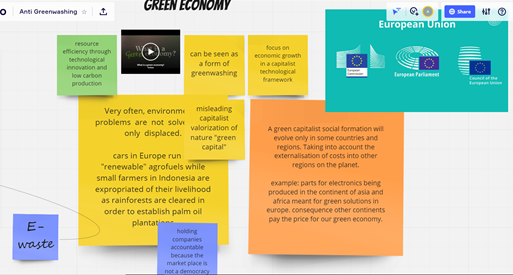
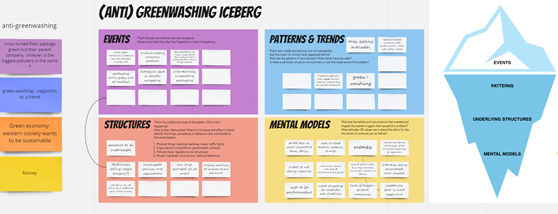
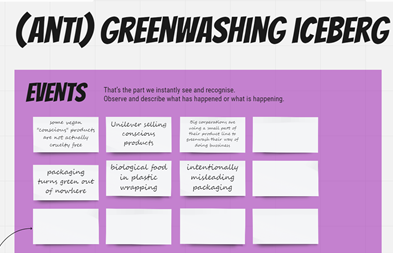
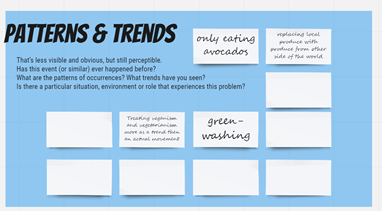
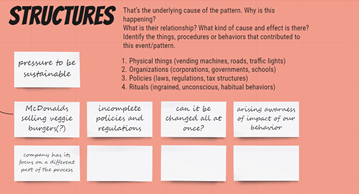
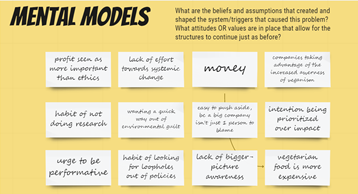
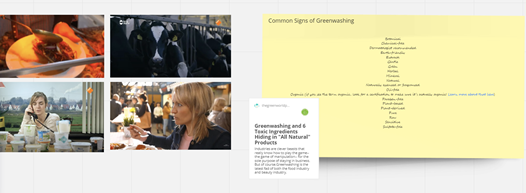
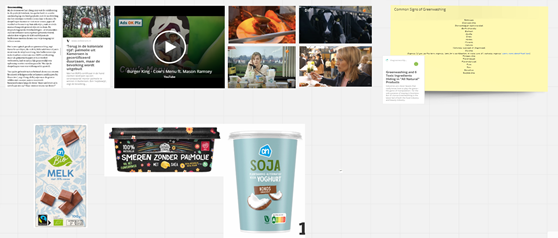
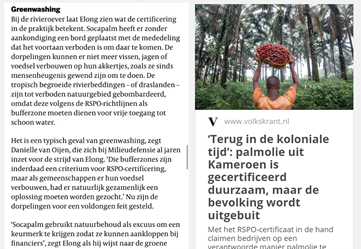
Andreea Ionescu
One concept, and corresponding term, that I have found relevant for both myself personally and for the team project was the idea of “relationality” –understanding the interconnectedness of things. This concept appears under various names, starting with Arturo Escobar’s podcast “Warming Up to the Pluriverse #7: On Designing Otherwise” as the idea of “radical interdependence”, or that “everything exists because everything else exists” – and therefore: the world as a web of loops, “inherently deeply interconnected”.
In the movie “Symbiotic Earth: How Lynn Margulis Rocked the Boat and Started a Scientific Revolution”, relationality is the main theme, under the name of symbiosis – mainly in contrast with the way in which Neo-Darwinism borrowed neo-liberal metaphors to oversimplify Darwin based on “laissez-faire socio-economic theory applied to nature”, and built a biased reductionist scientific worldview that dominated publications and research, deeming nature as mechanical and competitive, while Lynn explains how in reality, cooperation is the main driver of evolution, zooming in on bacteria that had achieved a metabolic circularity that humankind can only dream of.
As a bigger pattern, this concept “goes against the conventional way of thinking that suggests that entities exist as individuals”(Escobar, 2021), a way of thinking which separates, for example, the mind from the body. Karen Barad also details on this concept in her speech “After The End of the World…” – talking about “dissecting the concept of border, separation, otherness” as a result of a transition from a Newtonian worldview to a worldview that incorporates Quantum Theory, and emphasizing how only through a sense of authentic, “ongoing responsibility towards the entangled other” can real justice be achieved.
The idea of embodiment and embodied consciousness further connects to the concept of “the I” in “Decolonization as care” by Uzma Z. Rizvi – hinting at the fact that subjectivity is not separate, but incorporated into objectivity, that truth isn’t disengaged and neutral, but that an universal truth is, in fact, a comprehensive system that must encompass a variety of perspectives and experiences in order to be accurate – that the Eurocentric idea of “universal truth” is not, in fact, the universal truth.
In relation to our project, which was centred around the “performativeness” of greenwashing in the context of food production, in which claims of ethical products are, in essence, a manifestation of Green Capitalism’s tendency to displace issues from one part of the world to another or to partly neglect the inherent purpose of said ethical action (such as vegan food not being animal-cruelty free) – it’s hard not to notice the presence of a global paradigm based around lack of awareness in regards to relationality, mainly playing on the idea of Eurocentrism to claim that the Global North is, somehow, the norm and the centre, which implies the ongoing act of choosing to avoid dire consequences caused by the solutions themselves in the Global South (one example found in the chapter “Green Economy” of Arturo Escobar’s “Pluriverse Dictionary” – “cars in Europe are run on “renewable” agrofuels, while small farmers in Indonesia are expropriated of their livelihood as rainforests are cleared in order to establish palm oil plantations”).
We decided to create a video that holds CEOs of big corporations, whom we commonly named “Alan’s” after Unilever CEO Alan Jope, accountable for greenwashing, using an example of Unox’s (Unilever’s daughter company) overpriced “green stew”, deemed conscious while “Unilever’s pollution footprint amounts to 70,000 tonnes per year” (The Guardian, 2020).
One practical example that we used as inspiration was “Food Unwrapped”, a British television series exploring food myths and tracing the entire supply chain and process of making a certain food item to the roots and in its entire complexity. We took inspiration from this in terms of tone of voice and visual aesthetic for our final video.
One concept from this practice that can be applied to my major is embodiment. Fashion Design takes art to the realm of the human body, exploring the relationship between full and empty space, something touched upon in more detail by Karen Barad as well. This leads, for example, to the idea of creating a piece of clothing with the wearer in mind, and really focusing on how it would feel for someone to walk, move around, bike, run, sleep in it. Of what identity would that create for the wearer, in the context of broader social background.
Sources:
Escobar, Arturo “Warming Up to the Pluriverse” Interview at Het Nieuwe Institut, Rotterdam 2021. Accessed June 3, https://soundcloud.com/hetnieuweinstituut/warming-up-to-the-pluriverse-talk-7-on-designing-otherwise
Demaria, Federico & Latouche, Serge “Degrowth” Pluriverse: A Post–Development Dictionary Delhi: Tulika Books, 2019.
Rizmi, Uzma. “Decolonization as Care.” Slow Reader: A Resource for Design Thinking and Practice, Eds. Strauss, Carolyn and Pais, Ana Paula. Amsterdam: Valiz, 2017.
Barad, Karen Professor of Philosophy “After The End of the World” at The European Graduate School / EGS. Saas-Fee, Switzerland. August 3rd, 2018. Public open lecture for the students of the Division of Philosophy, Art & Critical Thought. Youtube. Accessed June 3, 2021.https://www.youtube.com/watch?v=68I0y1koakA
Films, Bullfrog. 2018. “Symbiotic Earth: How Lynn Margulis Rocked the Boat and Started a Scientific Revolution Online | Vimeo on Demand.” Vimeo. November 28, 2018. Accessed June 3, https://vimeo.com/ondemand/symbioticearthhv/303309866.
Food Unwrapped. 2020. “What Is Paprika Actually Made Of? | Food Unwrapped.” YouTube. Accessed June 3, https://www.youtube.com/watch?v=gbrPygwexCg.
Laville, Sandra. 2020. “Report Reveals ‘Massive Plastic Pollution Footprint’ of Drinks Firms.” The Guardian. March 30, 2020. Accessed June 3, https://www.theguardian.com/environment/2020/mar/31/report-reveals-massive-plastic-pollution-footprint-of-drinks-firms.
https://www.youtube.com/watch?v=IH60d4MrAXk&ab_channel=GijsGrimm
Hannah Houmes